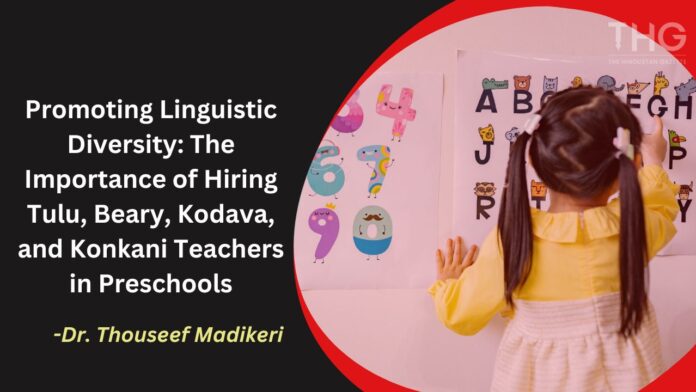The early years of a child’s life are crucial for language development. According to psychologists, 80% of brain development occurs between the ages of 3 and 8, making it the ideal time to introduce new languages. This period is characterized by brain plasticity, where a child’s brain exhibits a high degree of adaptability, making language acquisition a natural process.
In a multicultural country like India, it is essential to provide opportunities for children to learn and appreciate the diversity of languages. Karnataka, for example, is home to various communities that speak languages like Tulu, Beary, Kodava, and Konkani, alongside Kannada and English.
Unfortunately, many schools do not provide adequate provisions for teaching these regional languages. This not only deprives children of the opportunity to learn their mother tongue but also creates a sense of exclusion and disconnect from their cultural heritage.
To address this issue, it is imperative to appoint at least one teacher proficient in Tulu, Kodava, Beary, and Konkani languages in areas where these languages are spoken. This would ensure that children have access to quality education in their mother tongue, fostering a sense of pride and belonging within their communities.
Investing in multilingual education has numerous benefits. It enhances cognitive abilities, such as problem-solving, critical thinking, and creativity. Learning multiple languages also improves verbal skills, vocabulary acquisition, and linguistic flexibility. Moreover, it nurtures cultural understanding and empathy, instilling values of inclusivity and respect for diversity.
While some may argue that the cost of hiring additional language teachers is prohibitive, it is essential to prioritize education and allocate sufficient funds for these initiatives. The long-term benefits of promoting multilingualism far outweigh the initial investment. It not only benefits the individual children but contributes to the cultural and social fabric of society as a whole.
In conclusion, early childhood is the optimal time for language development. Introducing multiple languages in schools, especially in regions with linguistic diversity like Karnataka, is essential to provide children with a comprehensive and inclusive education. By appointing multilingual teachers, we can create an environment that celebrates linguistic diversity, fosters cultural understanding, and prepares children for a globalized world. It is crucial for the government to invest in these initiatives, ensuring that every child has equal access to a diverse and enriching education.
Thouseef Madikeri is the Director of the Centre for Advanced Research in Education



